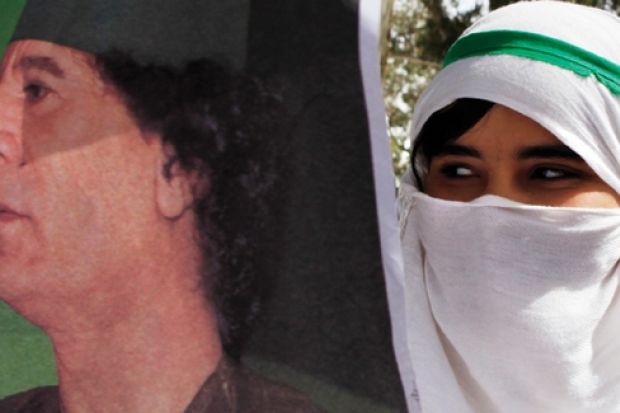UK universities may face further difficulties collecting millions of pounds in fees owed for Libyan students as Colonel Gaddafi's regime collapses.
Concern over fees for government-sponsored Libyan students became acute when the nation's cultural attache was expelled from the UK in June, leaving no one to authorise education payments.
Since then the rest of Libya's diplomatic staff have been expelled from the London embassy, to be replaced by officials from the National Transitional Council.
A spokeswoman for Heriot-Watt University, which had the UK's fourth-highest number of Libyan students in 2009-10, said it was owed £676,000 in outstanding fees. "We received some payments from the embassy in the final quarter of the financial year 2010-11...and a payment was made in early August against monies owing."
But since the expulsion of diplomatic staff, she said, "it appears there are issues relating to the authorisation of payments, and we are awaiting the appointment of new diplomatic staff who can complete such authorisation".
Heriot-Watt said students applied and were accepted on an individual basis and the university had "no partnership deal or framework with the Libyan government".
Newcastle University is one of only a handful of institutions to have been paid in full, it says. Its vice-chancellor, Chris Brink, said last month in his report to the university's council: "We have recently received £622,000 cash payments from the Libyan Embassy in respect of students sponsored by the Libyan government and are possibly one of the first universities in the UK to receive payment since the start of the current troubles."
A Newcastle spokeswoman said: "We have about 80 Libyan students and we are happy that their financial obligations for 2010-11 have been discharged. The situation in Libya is fast-moving and a little uncertain, for us and for our continuing students. We are keeping our policy for next year under review."
Earlier this year, Sir Howard Davies resigned as director of the London School of Economics after criticism of the institution's links to the Gaddafi regime.
The LSE accepted a £300,000 research donation from a foundation run by Gaddafi's son, Saif, who has been at the forefront of his father's battle against rebels.
It also accepted a $50,000 (£30,200) payment for Sir Howard's advice to Libya's sovereign wealth fund and faced allegations that Saif's LSE doctorate was plagiarised - a claim the LSE is still investigating.
According to figures for 2009-10 from the Higher Education Statistics Agency, there were 2,880 Libyans studying in the UK. Among current students, some are now facing financial hardship and the freezing of their Libyan bank accounts, as well as visa problems. Some will be on visas that are set to expire, yet may feel uneasy returning home as unrest continues.
Register to continue
Why register?
- Registration is free and only takes a moment
- Once registered, you can read 3 articles a month
- Sign up for our newsletter
Subscribe
Or subscribe for unlimited access to:
- Unlimited access to news, views, insights & reviews
- Digital editions
- Digital access to THE’s university and college rankings analysis
Already registered or a current subscriber?
